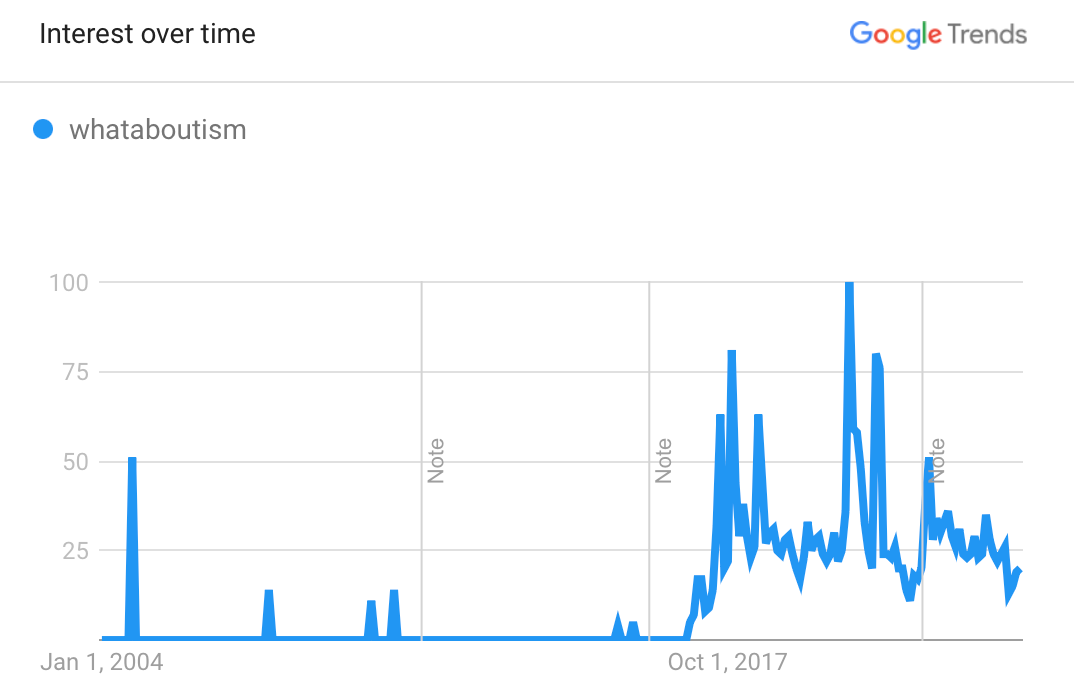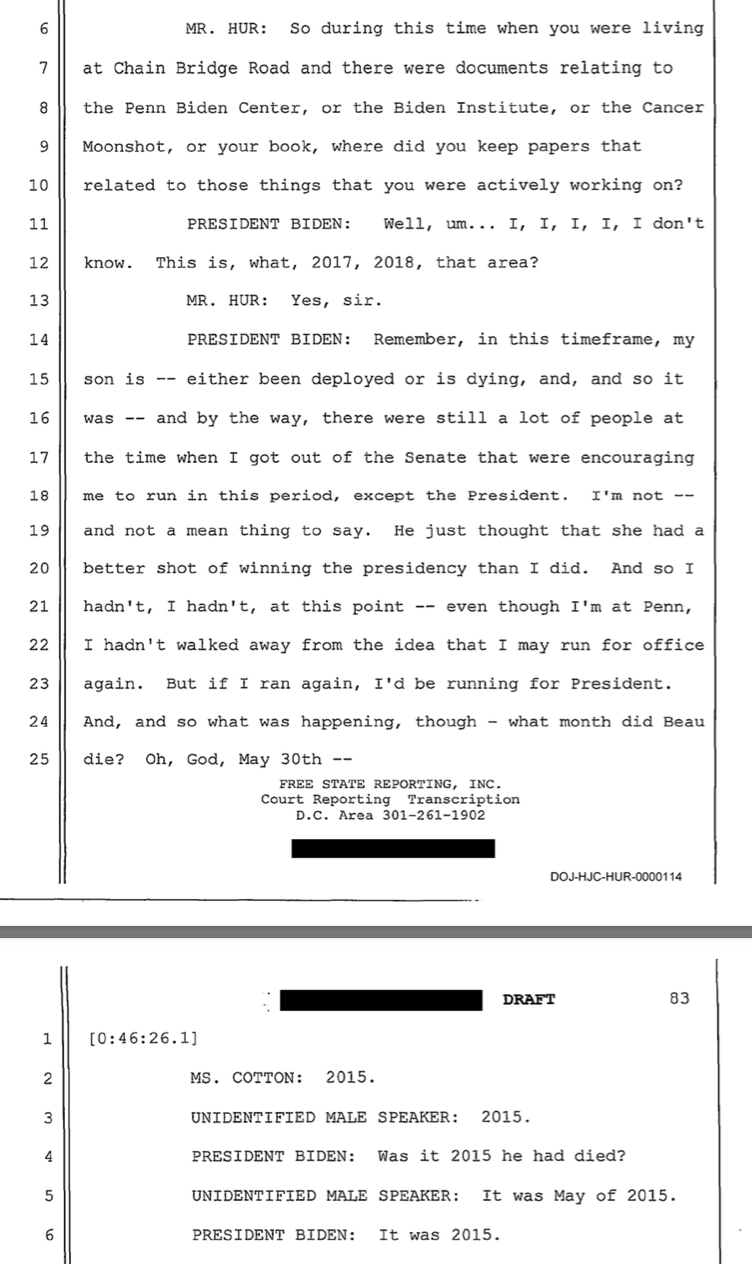Presidents should be held to a higher standard

Good morning! It’s Wednesday, March 13, 2024. Election Day is 237 days away. If this newsletter was forwarded to you, subscribe here. If you want to contribute to support my work, donate here.
“Whataboutism” is one of those terms, like “kompromat” and “the big lie,” that has roots long before the mid-2010s but has made something of a resurgence in American political discourse during the Trump era.
For the uninitiated, Merriam-Webster dictionary defines “whataboutism” as the “act or practice of responding to an accusation of wrongdoing by claiming that an offense committed by another is similar or worse.” The term dates back to the 1970s, owing its origins either to critics of Soviet propagandists or defenders of the Irish Republican Army, depending on who you ask. The idea is even older, though: the Romans called it the tu quoque fallacy (literally meaning “you too”). Today, you can’t scroll far on social media without either stumbling on someone engaging in the tactic or accusing someone else of engaging in it.

The truth is, sometimes whataboutism makes sense, and adds useful context to an allegation. But other times, it’s just plain annoying and serves to distract from the situation at hand. For the most part, in the political arena, you see it being used to respond to a candidate’s failings by pointing out the parallel failings of their opponent. This is especially true in the 2024 election, which features two historically unpopular and vulnerable candidates. Joe Biden is old! Well, yeah, so is Donald Trump. Trump kept classified documents after leaving office! Well, yeah, so did Biden.
In both those examples, the whataboutism mostly serves to strip out important context. Both candidates are old, yes, but their aging has often manifested itself differently; both candidates retained classified documents, but only one refused to return them once they were discovered. But, at least, it’s the type of response you would expect in a presidential campaign: if you nominate a candidate with vulnerabilities that mimic their opponent’s, you can expect to have a hard time making much hay out of those vulnerabilities appearing in your rival.
Lately, though, I’ve noticed a weird strain of whataboutism that moves past comparing candidates to their rivals and just comparing their behavior to that of, well, anyone. Twitter X is dreadfully unrepresentative of public opinion, but it’s a passable proxy for the political discourse of the highly engaged, so allow me to illustrate this mystifying trend with two examples I’ve seen on my own X feed in the past 48 hours.
The first concerns the recent allegation, from Trump’s former chief of staff, that the ex-president repeatedly praised Adolf Hitler while in office. I tweeted this on Monday because, well, I think it’s relevant that a presidential candidate thought it might be acceptable to say nice things about the perpetrator of the Holocaust.
More than one conservative pundit responded to me by seemingly dismissing the allegations against Trump on the grounds that Matthew Yglesias, the left-of-center blogger, apparently once tweeted that the “Nazis had a lot of good ideas.” (The tweet has been deleted, but it appears to have been commenting on a certain facet of Nazi economic policies. Yglesias’ tweets are often joking or sarcastic, not that this joke was particularly funny or appropriate.)
So Trump is basically just Matt Yglesias. https://t.co/JiNiWLuRaN
— Stephen L. Miller (@redsteeze) March 12, 2024
Matt Yglesias blocked me in 2017 because I made fun of him after he wrote/tweeted something about how the nazis were good at building infrastructure or something https://t.co/t2M5k3S5cO
— Joe Gabriel Simonson (@SaysSimonson) March 11, 2024
Other smaller accounts jumped in, also seeming to suggest that Trump’s comments were no big deal because Yglesias had said something similar.
But, of course, this is insane! Donald Trump wants to be leader of the free world. Yglesias has about 100,000 Substack subscribers and isn’t running for anything. If he ever is a candidate for office, his tweet about the Nazis will absolutely be fair game to bring up. But, until that day, it is a complete non sequitur. Just because some Democrat on the Internet once made a weird comment about the Nazis does not change anything about how noteworthy it is that presidential candidate Donald Trump did so.
Whatabout Joe Biden?, you might be asking. Don’t worry, he’s the subject of the next example.
Perhaps you heard about former Special Counsel Robert Hur’s testimony yesterday, on his recent report which — among other things — said that Biden presented himself to investigators as a “sympathetic, well-meaning, elderly man with a poor memory.” One of Hur’s examples was that, in an interview with the special counsel, Biden “did not remember, even within several years, when his son Beau died.”
Ahead of a hearing at the House Judiciary Committee yesterday, the transcript of Hur’s interview with Biden was released. Many Democrats, including the Biden campaign, declared that Hur’s report had been wrong, on the grounds that Biden correctly said that his son Beau died on May 30. But, for the record, the allegation against Biden was that he did not remember the year of Beau’s death, which the transcript confirmed.
I pointed this out on Twitter, which led to a swarm of responses of people saying: they forget things too!
Which does not strike me as a particularly compelling defense of Biden’s memory. Of course, everyone forgets things. But most Americans — and certainly most 81-year-olds — aren’t trying to convince the country that they should lead the other 330 million of us for the next four years. Anyone who is should be held to a higher standard than their peers.
If you forget things (and all of us do, of course), the stakes may be relatively minor. If Joe Biden forgets something, it can lead to a stock market dip (if said publicly), national embarrassment (if said in a meeting with Vladimir Putin or Xi Jinping), or national crisis (if said in the Situation Room). His memory matters.
Personally, reading over the Hur transcript (which everyone should do, it’s a rare and fascinating insight into how the president’s mind works), it mostly felt to me like vintage Biden. At turns, he is funny, punchy, prideful, and self-deprecating. He cracks jokes about finding “risqué pictures” of his wife (“She’s beautiful”) and about being a “frustrated architect.” Also characteristically, he rambles to the extreme: entire pages of the transcript are devoted to Biden telling stories about shooting archery in Mongolia, obtaining his first job as a lawyer, and his love of cars, until Hur brings him back on track.
His memory also appears to be subpar, although we can’t be sure whether that was a deposition tactic (as Hur seems to believe) or genuine. Twice, he forgets the word “fax machine” (even after being told it the first time). He does not seem to know when his vice presidency ended, or even that presidential elections take place in even-numbers years (e.g. 2016) while inaugurations take place in odd-numbered years (e.g. 2017).
I am very prepared to give someone grace about forgetting events around when their beloved son died, but it’s important to note that Biden brought up his son’s death, not Hur (as Biden falsely alleged last month). And while I don’t think it’s particularly relevant that Biden’s memory has gaps around such a terrible event, I think the context of the moment when Biden thought to bring up Beau actually is revealing. Take a look at that portion of the transcript:

In that single passage, Biden collapses no less than four time periods into one: he is asked about 2017-18 and launches into an answer about that period, and then asserts that is when Beau was “deployed” (2008), which he corrects to “dying” (2015), and also when he “got out of the Senate” (2009), by which he means the vice presidency (2017).
The issue here is not whether Biden knows his son died in 2014 or 2015, which would be an understandable error. It’s that he brought up his son’s death at all when federal investigators were trying to ascertain key facts about his post-vice presidency, even though the events around Beau’s death are competely orthogonal to that period. It seems to me that what Biden is really doing is conflating two key periods in his own life: 2015-16, when Beau was dying and when he was deciding whether to run for president in 2016 (the time when many people “except the president” were encouraging him), and 2017-18, when he was deciding whether to run for president in 2020 (the time when he was “at Penn” but “hadn’t walked away from the idea”). In the interview, he talks about these two periods as if they were the same.
Perhaps that confusion is understandable, because Beau’s death created such a fog and the two decision-making periods likely included similar conversations. But it is still a fairly big error to make, especially since it suggests the president does not have full recall of something as fundamental as the events that led him to the White House in the first place. To me, that larger confusion of those two decision-making periods writ large is much more concerning than merely having to be told the year his son died.
And maybe it would be more excusable, on the grounds that losing a son would lead to memory fog, if Biden didn’t already frequently make similar errors: confusing things that are similar in type (the leader of the country that borders Israel vs. the leader of the country that borders the U.S., the leader of France in the 1980s vs. the leader of France now) but very different in reality, with differences that are relevant to how he does his job.
Ultimately, it will be up to Americans to decide if Biden’s memory lapses are merely trivial or if they are having a bearing on how he does his job (and, of course, since American elections are binary, to judge these vulnerabilities of Biden’s against the vulnerabilities of his opponent, who has been criminally indicted four times). So far, many of the people who have interacted with Biden (even rivals, like Kevin McCarthy and Vladimir Putin) have walked away concluding he can hold his own in an official capacity. Obviously, Biden’s supporters are making a bet that this will hold true for another four years, until he is 86.
But I hope that we dispense with the notion that just because other octogenarians make mistakes like Biden’s that that should tell us something about his qualification to be president. Of course, we all make the same kinds of errors as Biden — mixing up things that are similar in type — in our own lives all the time. But, again, most of us are not trying to be president. Separately from your opinion on Biden or his memory, I hope we can agree that we want more out of our president than just the average of their age. That kind of whataboutism — me quoque, we could call it — is utterly unconvincing to me. (Even more concerning were commentators who suggested Biden’s slip-ups were forgivable since the interview took place just after the October 7th attack. Such an international crisis is precisely when you want the president to be most alert, and when it is most important that their memory is on its A-game.)
One of the best books to understand Joe Biden — for my money, one of the best books to understand American politics — is “What It Takes” by Richard Ben Cramer. I have always loved the words he used to open the 1,000-plus page tome:
None of my friends ever thought he should be President—much less that he could be. Of course, we were all taught that it was possible (in America, God bless her). But our lives separated us from that notion by the time we left our teens. A President—the President—was someone altogether larger, and more extraordinary, than we. Though we might like or revile him, though we could judge him (and even send him packing) by and by ... though a million words were written each day on his policies and politics, though millions of people might listen to his speeches, or watch a TV tour of his house ... though his face and his voice, his wife, kids, and dog would be known to every sentient adult, though his name (or initials) would conjure up a time of our lives—for the rest of our lives ... still, I came of age knowing, somehow, the life of this figure must be something so foreign to mine as to render it, finally, unknowable.
Of course, any of us can be president. But only a very small few are convinced that they should be. We should not excuse their failings by comparing them to our own. This election cycle, let’s talk frankly about the vulnerabilities of those who think they have “what it takes” to be president, and assess those vulnerabilities squarely on their own terms. Wiping them under the rug serves none of us whose sacred trust they are asking for.
More news to know.
Speaking of Trump vs. Biden: Biden and Trump clinch nominations, setting the stage for a grueling general election rematch (AP)
- From the newsletter archives: Presidential rematches throughout history
In the courts: Federal judiciary clamps down on ‘judge-shopping’ tactics that have helped Texas block Biden and liberal policies (CNN)
Third parties: Aaron Rodgers and Jesse Ventura Top R.F.K. Jr.’s List for Running Mate (NYT)
House GOP in chaos: Republican Rep. Ken Buck is exiting Congress early, further eroding GOP majority (NBC)
The day ahead.
— President Biden will travel to Milwaukee, Wisconsin, visiting a key battleground on the first formal day of his general election campaign. He will deliver remarks at an official event on the economy and at a campaign event.
— Vice President Harris will record two political radio interviews.
— The Senate is out for the day.
— The House will vote on the Protecting Americans from Foreign Adversary Controlled Applications Act, which would force the Chinese company ByteDance to either sell TikTok or face a ban from U.S. app stores. The bipartisan bill was approved unanimously by the House Energy and Commerce Committee. It is being voted on today under suspension of the rules, which means it will requires two-thirds support to pass.
— The Supreme Court is out for the week.
Thanks for reading.
I get up each morning to write Wake Up To Politics because I’m committed to offering an independent and reliable news source that helps you navigate our political system and understand what’s going on in government.
The newsletter is completely free and ad-free — but if you appreciate the work that goes into it, here’s how you can help:
- Donate to support my work or set up a recurring donation (akin to a regular subscription to another news outlet).
- Buy some WUTP merchandise to show off your support (and score a cool mug or hoodie in the process!)
- Tell your family, friends, and colleagues to sign up at wakeuptopolitics.com. Every forward helps!
If you have any questions or feedback, feel free to email me: my inbox is always open.
Thanks so much for waking up to politics! Have a great day.
— Gabe
